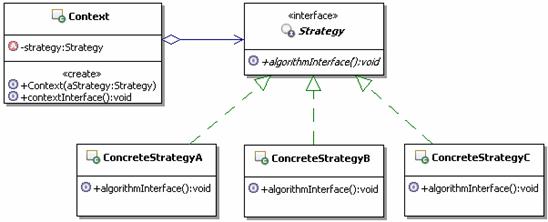设计模式之策略模式
场景
首先看这么一个场景:
假定现在需要实现一个简化的报价管理,实现如下的功能:
-
对普通客户或者是新客户报全价.
-
对老客户报的价格,统一折扣5%.
-
对大客户报的价格,统一折扣10%
不用模式的解决方案
也就是现在的我的水平:
public double quote(double goodsPrice, String customerType) {
if (customerType.equals("普通客户")) {
return this.calcPriceForNormal(goodsPrice);
}
else if (customerType.equals("老客户")) {
return this.calcPriceForOld(goodsPrice);
}
else if (customerType.equals("大客户")) {
return this.calcPriceForLarge(goodsPrice);
}
return goodsPrice;
}
这样的问题在于,当添加一个新的方法时,就要去修改原来的代码,违反了开-闭原则。还有,考虑这么一种需求:当节日的时候,物品在原来的基础上有不同程度的打折。这个时候就得跑到实现函数里改代码。
策略模式解决
我们让这几个相似的方法形成一系列方法,然后定义一个公共的接口,这样在使用的时候替换一下就可以了。 当要维护某个算法的时候,只要修改对应的方法,不会对另外的方法造成影响。
为了让算法实现独立与客户,需要引入一个上下文对象,这个对象负责持有算法,但是不负责选择使用哪个算法,让客户选择算法。
之前我想了很久为什么还要一个上下文对象。让客户直接持有接口不行吗?后来想到这样有更好的扩展性。比如现在要在原来的基础上打9折,只要在对象调用接口的哪个方法里,结果算出来之后 * num 就行了,客户这边接口不用变。
模式结构

- Strategy: 策略接口。
- ConcreateStrategy: 具体实现策略。
- Context: 上下文,负责和策略类交互。
策略模式实现
Strategy
public interface Strategy {
void apply();
}
ConcreateStrategy
public class ConcreateStrategyA implements Strategy {
@Override
public void apply() {
System.out.println("算法A");
}
}
public class ConcreateStrategyB implements Strategy {
@Override
public void apply() {
System.out.println("算法B");
}
}
public class ConcreateStrategyC implements Strategy {
@Override
public void apply() {
System.out.println("算法C");
}
}
Context
public class StrategyContext {
private Strategy strategy;
public StrategyContext(Strategy strategy) {
this.strategy = strategy;
}
public void getResult() {
strategy.apply();
}
}
Client
public class Client {
public static void main(String[] args) {
Strategy strategy = new ConcreateStrategyA();
StrategyContext context = new StrategyContext(strategy);
context.getResult();
}
}
那么问题来了:如何知道创建哪个对象呢。。应该是通过反射。
这里就是策略模式的大概内容了。明天再补上一些高级应用。
- 上一篇 MySQL 显示全部数据库的全部表的方法
- 下一篇 设计模式之装饰模式